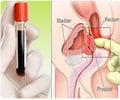In preventing underserved Latino men with prostate cancer from accessing the care and treatment they need, a combination of financial, cultural and communication barriers plays a major role.

According to the American Cancer Society, prostate cancer is the most commonly diagnosed cancer among Latino men. Additionally, Latino men are more likely to be diagnosed with later-stage disease than non-Hispanic white men.
"We found that an array of obstacles compromise access and frequently result in negative outcomes," said Sally L. Maliski, associate dean of academic affairs at the UCLA School of Nursing and senior author of the study. "Sadly, these obstacles disproportionately affect underserved individuals and require a new focus on not only adequate health care coverage but also on the array of hurdles that limit patient access."
The UCLA study looked at Latino men who were enrolled in Improving Access, Counseling and Treatment for Californians With Prostate Cancer (IMPACT), a state-funded public assistance program. The analysis revealed barriers throughout the entire prostate cancer–care process, including screening, treatment and follow-up care.
Among the key findings:
Financial hardship Low socioeconomic status was commonly cited by the Latino men in the study as the primary impediment to care. The inability to afford medical insurance not only made it difficult to access care but also intensified the gravity of the prostate cancer diagnosis, leaving many participants feeling hopeless.
Lack of doctor continuity and care coordination Participants frequently experienced poor care coordination, increased distrust for their doctors and decreased levels of comfort when care was administered disjointedly, by a frequently changing group of medical personnel.
Inadequate access to primary care left many participants ill-equipped to navigate a complex medical system that often requires self-advocacy to demand the right care.
Communication and education A lack of health literacy among the men, compounded by insufficient provider awareness of this issue, frequently resulted in the men misunderstanding doctors' treatment recommendations and procedures.
Patients' limited proficiency in English also often hampered their ability to describe their symptoms and express their needs to providers.
"Our study highlighted that we have an intricate web of barriers — societal, system and individual — that when combined leave many individuals without the care they should be receiving," Maliski said. "These overlapping obstacles make it clear we need a system where not only is care affordable but where we use a multi-faceted approach to improve access, increase health literacy and greatly improve care coordination."
Source-Eurekalert
 MEDINDIA
MEDINDIA


![Prostate Specific Antigen [PSA] & Prostate Cancer Diagnosis Prostate Specific Antigen [PSA] & Prostate Cancer Diagnosis](https://images.medindia.net/patientinfo/120_100/prostate-specific-antigen.jpg)
 Email
Email









